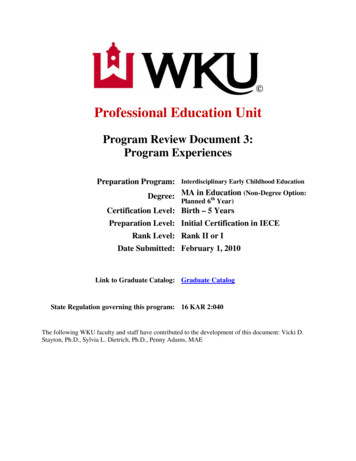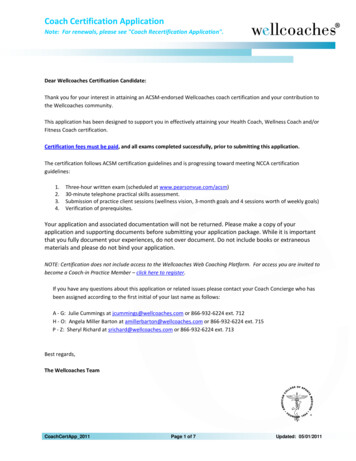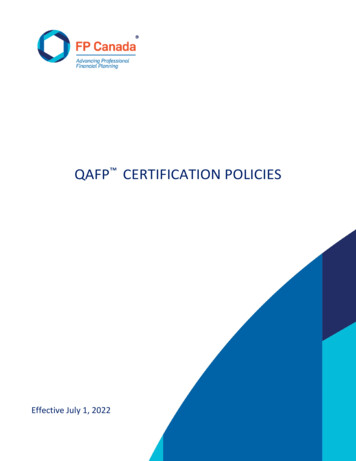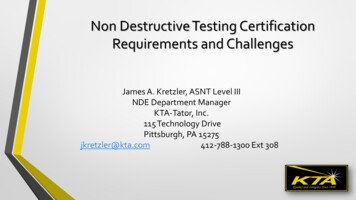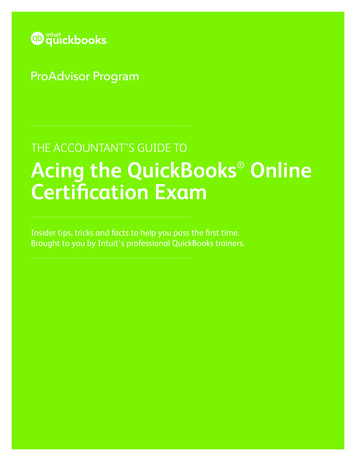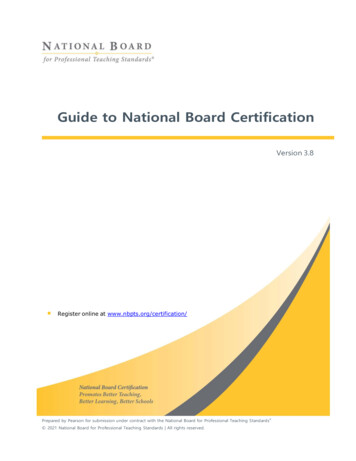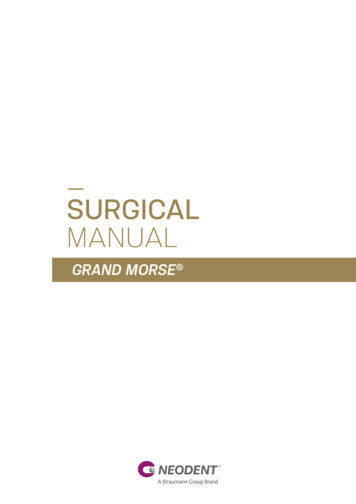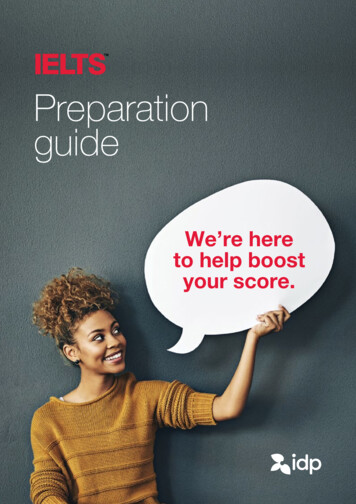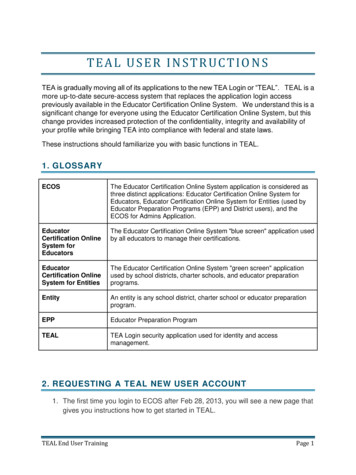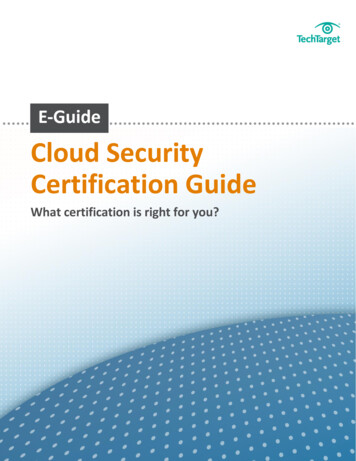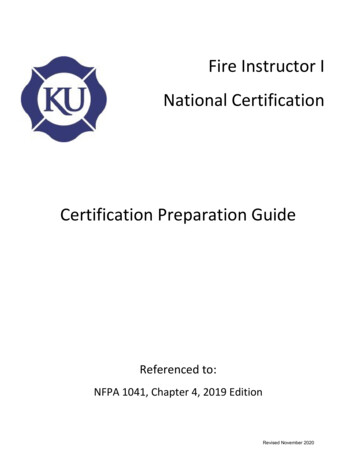
Transcription
Fire Instructor INational CertificationCertification Preparation GuideReferenced to:NFPA 1041, Chapter 4, 2019 EditionRevised November 2020
Referenced to:NFPA 1041, Chapter 4, 2019 EditionIFSTA, Fire and Emergency Services Instructor9th Edition, 2019Copies of this document may be downloaded from: ionThis Study Guide is provided at nocost to the user by the Kansas Fire& Rescue Training Institute as aservice to the firefighters of Kansas.Copyright by the Kansas Fire & Rescue Training Institute, University ofKansas. This document is provided for use under the following provisions:1. Duplication is permitted if the document is duplicated in its entirety,including cover, without editorial changes.2. No other cover or information is attached as part of the document.Revised November 2020
Dear Certification Candidate,Welcome to the National Firefighter Certification Program!The Kansas Fire & Rescue Training Institute is accredited by the International Fire Service Accreditation Congress(IFSAC) and by the National Board on Fire Service Professional Qualifications (NBFSPQ - also known as “ProBoard”). These accreditation agencies establish rules and standards to follow in the administration,recordkeeping, and providing of National Certification for the fire service. Through this accreditation, Kansas Fire& Rescue Training Institute is authorized to issue accredited National Certifications to individuals meeting therequirements of selected national standards.Kansas Fire & Rescue Training Institute’s role in the process is to maintain testing materials and a fair system ofadministering certification exams.This National Certification Preparation Guide was specifically designed to help you prepare for the examinationprocess ahead. This guide gives reading references for the written exam and the skills exam. By using this guide,you will be looking at the same pages the test writer was looking at when they wrote the test questions anddeveloped the skills evaluation sheets.Our Coordinators and Evaluators are here to observe your skills and knowledge – they will not help you pass thetest.Our staff and evaluators will treat you with respect and professionalism. Our goal is that you complete thetesting process with satisfactory performance and earn your National Certification.Good luck,KFRTI StaffRevised November 2020
National CertificationNational Certification is a professional credential that verifies your proficiency in the level to which you were/arecertified. Kansas certifications do not expire. If you are moving to another state, you should contact thecertification entity in that state to find out if your National Certification from Kansas is recognized in that state.Certification Program MissionThis mission of the National Certification Program is to maintain an accredited system for Kansas fire servicemembers to earn National Fire Service Certification professional credentials.Certification Program Values and PrinciplesIn the conduct of this program, the Kansas Fire & Rescue Training Institute uses the values listed below to guideour professional conduct; they form the foundations and parameters of this program. We hold in high regard honesty and integrity in ourselves and those we serve. Kindness and professionalism guide our instructors and our evaluators. We respect the fire and emergency service and those who serve in it. Transparency of our system, processes, and policies is paramount. The certification standards drive fair evaluation and testing. We value our role as the provider and protector of the national certification program’s credibility.Academic IntegrityWe hold staff (including part-time) and certification candidates to identical ethical standards. We expectprofessional behavior at all times. Any incident of academic misconduct by a candidate, will invalidate their testresults, forfeit their certification fee, and they may be subject to suspension from the certification process forone year.Academic misconduct includes cheating, plagiarism, falsification of records, unauthorized possession ofexaminations, intimidation, and/or other actions that may improperly affect the evaluation of a candidateor assisting others in any such act.Our policy on academic misconduct is that of “zero tolerance.”The University of Kansas prohibits discrimination. Specifically, the University of Kansas prohibits discrimination onthe basis of race, color, ethnicity, religion, sex, national origin, age, ancestry, disability, status as a veteran, sexualorientation, marital status, parental status, gender identity, gender expression and genetic information in theUniversity’s programs and activities. Retaliation is also prohibited by University policy.Revised November 2020
How to Use the Certification Preparation GuideThis National Certification Preparation Guide is specifically designed to help you prepare for the examinationprocess ahead. This guide provides reading references for the written exam and the skills exam.We have included information in this guide that will help you achieve the professional credential that is FireService National Certification. There are a few key elements in preparing for the National Certification Exam.They are: 1) Take some time between the end of your course and the certification exam to focus on studying forthe exam. 2) Use this Preparation Guide to help focus on the requirements of the National Standard and yourstudy time.STEP 1:Review the Administrative information in front of this Preparation Guide. We have included some important information about the program and the steps of certification. Pleasetake a few minutes and review these pages.STEP 2:Review the Reading Reference PagesThe Reading Reference pages are arranged by Job Performance Requirements (JPRs), which are determinedby the correlating NFPA standard. Read and study the pages listed in the written exam reading pages. By reading these pages, you are reading the same pages the test developer was when they were writingtest questions.STEP 3:Review the Skill Evaluation Sheets in this Certification Guide. Take note of the Instructions to the Candidate (grey boxes) on each Skill Sheet. These are theinstructions that the evaluator will give to you in each station before you test. Skills sheet references take you back to the reference manual to explain the skill. You will be graded onlyon those items listed on the skill evaluation sheets. Use these in your practice and exam preparations.STEP 4:Read & Review, Read & Review, Read & Review, and Practice, Practice, Practice! Don’t practice until you do it right; practice until you can’t do it wrong!STEP 5:Get a good night’s rest before the exam. You can be tired in any of three ways: Mentally, Physically, and Emotionally. If you are tired in any ofthese ways, it will make you tired in ALL of them. Save the party for after the exam get a good night’s rest .eat a good breakfast (if you test inthemorning) easy on the sugar and caffeine and relax!GOOD LUCK!Note:If you are exploring National Certification and haven’t taken a course specifically for the level of certificationyou are seeking, we STRONGLY suggest that you start the process by taking a course. Under certaincircumstances, you may challenge some certification exams. Persons who take a course first do much betteron the exam. Contact the Kansas Fire & Rescue Training Institute for more information.Revised November 2020
National Certification Application & ProcessesApplication:Applications are required before testing. Visit the KFRTI web fication) to download theapplication.Registration for Exams:Pre-registration is required. Go to the KFRTI online registration point to registerand pay the certification tegoryId 10019)Certification Fees:Certification fees must be paid before the exam date. Individuals are requiredto pay fees online when registering for an exam. An organization may requestto be billed, this billing process requires a Purchase Order from thatorganization stating each candidate’s name. To arrange billing, call the KFRTI at1-866-804-8841. Billing cannot be processed online.Number of Attempts:Candidates are allowed two attempts per test per application, and alltesting must be completed within one year of the first testing activity.Additional testing requires a new application and fee.Picture I.D. Required:A government issued photo I.D. is required at the test site.Accommodations:The Kansas Fire and Rescue Training Institute as part of the University ofKansas adheres to the requirements of the Americans with Disabilities Act.Certification candidates requesting accommodations must submit the requestin writing two (2) weeks in advanced of testing. The request must include acopy of the diagnosis by a qualified professional. Upon receipt of anaccommodations request, the Kansas Fire and Rescue Training Institute willreview the request, and then notify the requestor of the proposedaccommodations.What if I Fail the Exam?Failure of any required component (not submitting a currently valid certification or licensure KBEMSnumber, less than 70% on the written exam or less than 100% of the skills exam) constitutes a failedattempt.a. Candidates may re-test on any component of the exam (written, or skills exams) and resubmitcurrent and valid KBEMS medical credentials.b. Candidates must register to take a retest at another test site. No walk-in testing is allowed. Toregister for a retest, call the Institute at (toll free) 866-804-8841.c. Candidates are allowed two (2) attempts at any portion of the exam. If a candidate fails anyportion of the exam twice, a new application and fee is required. The new application starts thecertification process over, and all portions of testing will have to be retested.d. The Institute strongly recommends that candidates study or seek additional training beforeattempting the exam for a third attempt.Time to Complete CertificationCandidates have one year from the date of their first testing action to complete their certification.Retaking the written test, retesting skills, submitting verification forms, and all other requirements mustbe completed within that year. Failure to complete the certification within that year will invalidate allprevious testing. The candidate will be required to submit a new application, new fee, and newverification forms retest for the written and skills tests before certification.Revised November 2020
Kansas Fire & Rescue Training Institute’s Certification Requirements for Fire Instructor IPrerequisitesCandidates seeking certification for Fire Service Instructor I within the KFRTI, the University of Kansas,must meet the requirement of being a member in good standing of a Kansas fire department.All candidates are required to have successfully completed the written and skills testing for NFPA 1041,Chapter 4, by successfully completing the 5-day Fire Instructor 1 class OR the Fire Instructor l onlinetraining (plus the 2-day Instructor l Seminar) before testing on NFPA 1041, Chapter 4, 2019 edition forInstructor I national certification. Certifications from other entities will be evaluated for reciprocity asper the KFRTI’s reciprocity policy.Fire Instructor I - Certification ExamWritten Exam:a. The Fire Instructor l Written Exam includes 100 multiple choice and true/false questions.b. Candidates are allowed two (2) hours to complete the exam.c. Answer sheets and pencils are provided. A Bubble Sheet style answer sheet that candidates fillin small circles to indicate the correct answer (a, b, c, d) is used.d. No cell phones, radios, or other electronic devices are allowed in the room while an exam isbeing administered (an exception for radios that allow “on-duty” personnel to receive alarmsmay be granted under special circumstances).e. A 70% minimum score is required to pass the written exam.f. If you fail your first attempt of the written exam, a second attempt can be made within twelvemonths of the date of the first attempt of the national certification written exam.Skills Exam:a. The Skills Exam is based on Requisite Knowledge and Requisite Skills objectives (JobPerformance Requirements/JPRs) listed in NFPA 1041, Standard for Fire Service InstructorProfessional Qualifications, Chapter 4, 2019 Edition. Candidates will be required to score 100%on skills checklists when delivering a prepared lesson plan as per project book instructionsprovided by the Kansas Fire & Rescue Training Institute.b. All instructor skills sheets are provided to candidates as part of this Fire Service Instructor ICertification Preparation Guide.c. All skills are completed and submitted in the form of a project book provided to the candidateby the Kansas Fire & Rescue Training Institute. Electronic submissions are acceptable.d. All submitted project books must be postmarked (or hand delivered) within twelve months ofthe date the candidate takes the national certification written exam.e. Project book submissions become the property of Kansas Fire & Rescue Training Institute andwill not be returned. All candidates should make a copy of their work before submitting.f. The skills exam (i.e., the project book) requires a 100% score to pass.g. Re-testing is allowed by submitting a second attempted project book within twelve months ofthe date the candidate takes the national certification written exam.h. If you fail your second attempt, you will be required to re-register and re-take the Instructor Icourse; pay a new certification fee, and successfully complete both Part I and Part II of thecertification exam.Revised November 2020
Fire Instructor I - Written ExamStudy/Preparation Information and MaterialsFire Instructor I Written Exam:100 multiple choice and true/false questionsTime allowed to take the exam:Two (2) hoursPassing Score:70% (or higher)NFPA Standard Reference.Written Certification Exam is based on: NFPA 1041 Standard for Fire and Emergency ServicesInstructor Professional Qualifications, 2019 EditionReading Reference/Text.IFSTA, Fire and Emergency Services Instructor 9th Edition, 2019.Written Exam Study Pages (Reading Reference)(Test questions are taken from these same pages)Section Subject &NFPA Objective (JPR) NumberReading/Study PagesManagement of basic resources4.2.1pp. 14, 16, 47Assemble Course Materials4.2.2pp. 14, 49-52, 54-57, 63-68Prepare Requests for Resources4.2.3pp. 58, 63-68, 85, 205-207Schedule Single Instructional Sessions4.2.4pp. 209-212.Complete Training Records and Reports4.2.5pp. 200, 205-209(Continued on next page)Revised November 2020
Fire Service Instructor I Certification Preparation GuideReading Reference for IFSTA, Fire and Emergency Services Instructor 9th Edition, 2019.(cont.)Review and adaptation of prepared instructionalmaterials4.3.1pp. 51-52Review instructional materials, 4.3.2pp. 31-34, 41-43, 48-53, 56-58, 69-71, 85,108-112, 141-146, 161-164, 168-170Adapt a prepared lesson plan, 4.3.3pp. 41-43, 51-52, 63-71, 85Organize the learning environment,4.4.2Present and adjust prepared lessons,4.4.3Adjust to differences in learner characteristics,abilities, cultures, and behaviors,4.4.4Operate instructional technology tools anddemonstration devices, 4.4.5Administer oral, written, and performance testsLessons 4.5.2pp. 41-43, 53, 55, 57-58, 71-83, 89-101,103, 131-133, 165-178pp. . 25-31, 35-41, 54, 57-58, 64, 107-135,137-138, 141-142, 165-181pp. 31-43, 56-57, 127-128, 137-138,142-157, 165-166pp. 71-82, 93-95, 103, 115-116, 126-127,131-133, 137-138, 166-167pp. 17-21, 146-147, 185-192,198-199Grade student oral, written, or performance tests,4.5.3pp. 185-187, 192-196, 199Report test results,4.5.4pp. 185-187, 195, 200-201Provide evaluation feedback to students, 4.5.5pp. 196, 201Revised November 2020
Fire Instructor I Skills TestingStudy/Preparation Information and MaterialsFire Instructor I Skills Testing:In addition to the instructional presentation and training deliverynormally associated with traditional adult learning, a Fire ServiceInstructor I is expected to be able to perform administrativefunctions associated with program delivery, student supervision, andtesting. Additionally, a Fire Service Instructor I is expected to adaptpublished lesson plans to fit the needs of the specific department,situation, and adult learners.To document your ability to perform the basic functions listed above,the Fire Service Instructor I Candidate shall complete a project book;deliver an adapted, 30-minute lesson; administer a test or quiz; gradethe tests and report those grades; administer a course evaluationdocument; use and maintain audio visual equipment and othertraining aids; and provide written correspondence in the form ofletters, memos, or emails.Project Completion Time:Twelve months from the written exam date.Passing Score:100%NFPA Standard Reference.All Project Book skills are basedon Requisite Skills identified in:NFPA 1041 Standard for Fire and Emergency Services InstructorProfessional Qualifications, Chapter 4, 2019 EditionRevised November 2020
Fire Instructor ISkill Evaluation SheetsThe Skills Evaluation Sheets found in this Preparation Guide contain the exact sameinformation found on Scoring Rubric forms used by evaluators when scoring project books.These sheets have been edited for the explicit use of grading skills and should not be used tolearn the skills.These Skill Evaluation Sheets have been included in this Preparation Guide for the purposeof guiding you as you make your final preparations for completing your project book.Grading for the Skills Evaluation requires 100% of the skill items listed on these sheets to beperformed. You will be evaluated only on the skill items that are listed on these evaluationsheets.Pages in this guide contain four Instructor I Skill Evaluation Sheets covering four primaryareas as follows: Program Management Instructional Development Instructional Delivery (Part 1 and Part 2) Evaluation and testingRevised November 2020
Instructor I Skills Sets: Program Mgt./ Instructional DevelopmentItem 1Reference: NFPA 1041, 2019 Edition, Chapter 4, Job Performance Requirements:4.2 Program Management, 4.3 Instructional Development,4.4 Instructional Delivery and 4.5 Evaluation and Testing.(Sections 4.2.2 to 4.5.5)IFSTA, Fire and Emergency Services Instructor 9th edition, 2019Evaluation Materials Required: KFRTI Instructor I Project Book.Evaluator's Instructions to CandidatesAll skills are demonstrated through the completion of a certification project covering all evaluated skill items.All written documents and video presentations must be the candidate's original work and summited in theproject book format provided by the Kansas Fire & Rescue Training Institute.To pass skill sections 4.2.2, 4.2.3, 4.2.4, 4.2.5, 4.3.2 and 4.3.3, you must successfully complete all elementsrequired for Tab 1, Tab 2, Tab 3, Tab 4, Tab 7 and Tab 10 in the KF&RTI Instructor 1 Project Book.Evaluated Skill Items (from project book)Section 4.2.2 - Assemble Course Materials1. Course materials required for the class were assembled.1st AttemptPassFail2nd AttemptPassFailSection 4.2.3 - Prepare Requests for Resources1. Effective oral and written communication techniques were used.2. Completed appropriate records and forms.Section 4.2.4 - Schedule Single Instructional Sessions.1. Completed a training schedule.Section 4.2.5 - Complete Training Records and Report Forms1. Wrote basic reports (completed a Training Transmittal Report)2. Completed appropriate recordsSection 4.3.2- Review Instructional Materials1. Analyzed training resources, facilities & materials for class applicability.Section 4.3.3 - Adapt a Prepared Lesson Plan.1. Adapted a prepared lesson plan to department needs.2. Instructor was prepared to teach the lesson plan.3. Instructor demonstrated appropriate organizational skills.Candidate's name:Notes (please include comments/explanation for failure):Evaluator's Signature:Station: PassFailDate:Revised: November 2020
Instructor I Skills Sets: Instructional Delivery (Part 1)Item 2Reference: NFPA 1041, 2019 Edition, Chapter 4, Job Performance Requirements:4.2 Program Management, 4.3 Instructional Development,4.4 Instructional Delivery and 4.5 Evaluation and Testing.(Sections 4.2.2 to 4.5.5)IFSTA, Fire and Emergency Services Instructor 9th edition, 2019Evaluation Materials Required: KFRTI Instructor 1 Project Book.Evaluator's Instructions to CandidatesAll skills are demonstrated through the completion of a certification project covering all evaluated skill items.All written documents and video presentations must be the candidate's original work and summited in theproject book format provided by the Kansas Fire & Rescue Training Institute.To pass skill sections 4.4.2, and 4.4.3, you must successfully include all required elements on this sheet duringa video recording of these skills for the KF&RTI Instructor 1 Project Book (Tab 10).Evaluated Skill Items (from project book)Section 4.4.2 - Organize the Learning Environment1. The learning environment was organized and safe.1st AttemptPassFail2nd AttemptPassFail2. The lighting was appropriate.3. Climate control was appropriate4. Audio visual equipment was adequate.5. Training aids and props were appropriate.6. Seating arrangement was appropriate.7. Correctly used instructional media and teaching aids.Section 4.4.3 - Present and Adjust Prepared Lessons1. Lesson plans' methods were used in an instructional setting.2. Demonstrated proper oral communication techniques.3. Adapted to changing circumstances (if applicable).4. Stated outcomes were achieved.Candidate's name:Station: PassFailNotes (please include comments/explanation for failure):Evaluator's Signature:Date:Revised: November 2020
Instructor I Skills Sets: Instructional Delivery (Part 2)Item 3Reference: NFPA 1041, 2019 Edition, Chapter 4, Job Performance Requirements:4.2 Program Management, 4.3 Instructional Development,4.4 Instructional Delivery and 4.5 Evaluation and Testing.(Sections 4.2.2 to 4.5.5)IFSTA, Fire and Emergency Services Instructor 9th edition, 2019Evaluation Materials Required: KF&RTI Instructor 1 Project Book.Evaluator's Instructions to CandidatesAll skills are demonstrated through the completion of a certification project covering all evaluated skill items.All written documents and video presentations must be the candidate's original work and summited in theproject book format provided by the Kansas Fire & Rescue Training Institute.To pass skill sections 4.4.4, and 4.4.5 you must successfully include all required elements on this sheet duringa video recording of these skills for the KF&RTI Instructor 1 Project Book (Tabs 2 and 10).Evaluated Skill Items (from project book)Section 4.4.4 - Adjust to learner characteristics, abilities, and cultures1. Basic coaching and motivational techniques were used1st AttemptPassFail2nd AttemptPassFail2. Corrected disruptive behaviors (if applicable).3. Adapted lesson plan and materials to specific instructional situations.Section 4.4.5 - Operate instructional technology tools and demonstration1. Operated instructional technology tools.2. Used demonstration devices (if applicable)3. Proper transition techniques were accomplished.4. Field level maintenance and cleaning was utilized.Candidate's name:Station: PassFailNotes (please include comments/explanation for failure):Evaluator's Signature:Date:Revised: November 2020
Instructor I Skills Sets: Evaluation and TestingItem 4Reference: NFPA 1041, 2019 Edition, Chapter 4, Job Performance Requirements:4.2 Program Management, 4.3 Instructional Development,4.4 Instructional Delivery and 4.5 Evaluation and Testing.(Sections 4.2.2 to 4.5.5)IFSTA, Fire and Emergency Services Instructor 9th edition, 2019KFRTI Instructor I Project Book.Evaluation Materials Required:Evaluator's Instructions to CandidatesAll skills must be demonstrated through the completion of a certification project covering all evaluated skillitems. All written documents and video presentations must be the candidate's original work and summited inthe project book format provided by the Kansas Fire & Rescue Training Institute.To pass skill sections 4.5.2, 4.5.3, 4.5.4 and 4.5.5 you must successfully complete all elements required forTab 5, Tab 6, Tab 7, Tab 8 and Tab 9 in the KFRTI Instructor I Project Book.Evaluated Skill Items (from project book)Section 4.5.2 - Administer Oral, Written, and Performance Tests1. Appropriately administered oral, written, and/or skill performance tests.1st AttemptPassFail2nd AttemptPassFail3. Used proper assessment techniques.2. Skills checklists were used (if applicable).Section 4.5.3 - Grade Student Oral, Written, or Performance Tests1. Written tests were accurately graded using appropriate answer keys.2. Performance tests were accurately graded (if applicable).Section 4.5.4 - Report Test Results1. Test scores were recorded accurately.2. The test record forms were forwarded properly.3. Good communication reporting skills were used.4. Basic coaching techniques were used (if applicable).Section 4.5.5 - Provide Evaluation Feedback to Students1. Evaluation/feedback was provided to students in a timely manner.2. Good communication reporting skills were used.3. Basic coaching techniques were used (if applicable).Candidate's name:Station: PassFailNotes (please include comments/explanation for failure):Evaluator's Signature:Date:Revised: November 2020
There are afew key elements in preparing for theNational Certification Exam. They are: 1) Take some time between the end of your course and the certification exam to focus on studying for the exam. 2) Use this Preparation Guide to help focus on the requirements ofthe National Standard and your study time. STEP 1: Review the Administrative information in front of this Preparation Guide. Wehave .
